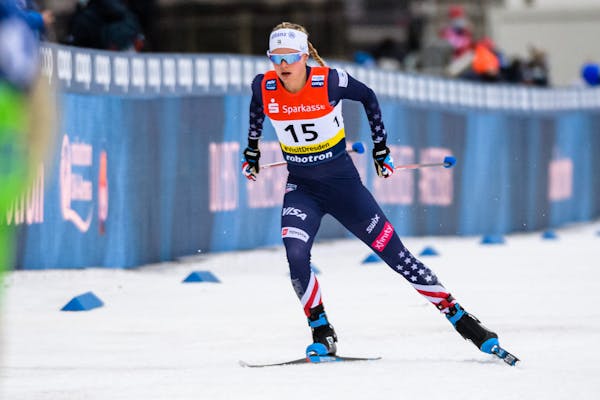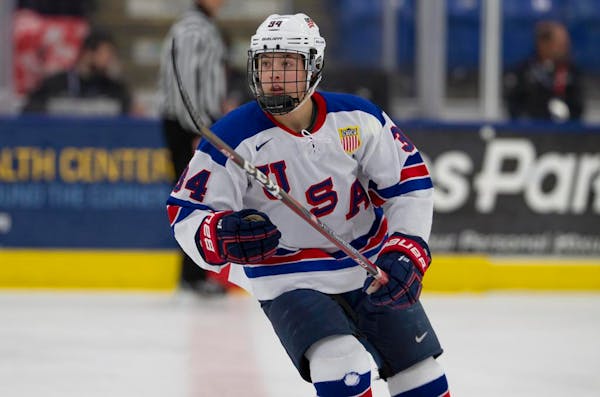ZHANGJIAKOU, CHINA — When she pushed her ski over the finish line, Jessie Diggins wasn't sure she had won a medal. She glanced up at the video screen and saw her name in third place, but she still wasn't ready to believe it.
Diggins had wrung every last ounce of energy out of her body in Tuesday's freestyle sprint, her second race of the Beijing Olympics. A little disoriented — and a little afraid to celebrate just yet — she kept looking at the results board, seeking confirmation that she really was an Olympic bronze medalist.
"Then I saw our whole team along the finish line, right along the boards,'' Diggins said. "And that's when I was like, 'Oh, my gosh. We got a medal.'''
Diggins has made a habit of making history, and Tuesday's bronze just added to her long list of breakthroughs. The Afton native became the first U.S. woman to win an Olympic medal in an individual cross-country skiing event, finishing behind Sweden's Jonna Sundling and Maja Dahlqvist.
Sundling, the reigning world champion in the sprint, ran away with the race. She dominated every phase — from qualifying through quarterfinals, semis and finals — and won her first Olympic gold medal by nearly three seconds. Sundling finished the 1.5-kilometer race in three minutes, 9.68 seconds, with her teammate Dahlqvist second in 3:12.56.
Rosie Brennan finished fourth, marking the first time two American women made the final in an Olympic cross-country sprint.
Though Diggins' accomplishment was historically significant because of its solo nature, she wasn't looking at it that way. No matter what it says in the results or the record book, she considers Tuesday's medal a group achievement.
After she won her first Olympic medal — a gold in the 2018 team sprint, the first-ever cross-country gold for the U.S. — Diggins said it belonged to everyone who helped her win it. She felt the same way about Tuesday's bronze. Particularly in the age of COVID, when her Olympic quest required even more sacrifices and support, Diggins wanted to share the credit.
Right after the race, she called her parents, Deb and Clay, and fiancé Wade Poplawski. Though they couldn't be there because of China's travel restrictions, Diggins' teammates made sure she got plenty of hugs.
"It was so cool to talk to my parents and Wade after the race and share this with them,'' Diggins said. "This year, there have been a lot of sacrifices to stay healthy, and battling the ups and downs of being gone all the time. They've just been there with unconditional love and support and belief, and that means everything.
"I really, truly believe this medal belongs to so many people who have helped me and pushed me, and supported me in training and racing and being on the road. It's just so special to share that.''
Her parents, who watched the race at their Afton home, were still looking after her during their long-distance celebration.
"After our happy congratulations, I reminded her to be sure to get enough to eat and drink, and to stay warm,'' Deb Diggins said. "Mostly, it was just great to be able to say how proud we are of her, today and always.''
Only one American, Bill Koch, ever had won an Olympic medal in an individual cross-country event. His 1976 silver in the 30k was the lone U.S. medal in Winter Games cross-country racing until 2018, when Diggins and teammate Kikkan Randall ended that long drought with the team sprint gold.
Last year, Diggins became the first American to win the Tour de Ski and the World Cup overall championship, ratcheting up expectations for her third Olympics. She finished sixth in the women's skiathlon Saturday and was happy with that outcome. Diggins called the freestyle half of that event some of the best racing of her life, and she believed she could build on that Tuesday.
The skiathlon showed Diggins that her fitness was perfectly dialed in. Though the sprint course at the Zhangjiakou National Cross-Country Centre is tough, she thought it played in her favor.
"I love this course,'' she said. "It's really hard. It's long. It's challenging. And that makes it a great course for me, because it's not just about pure, raw speed.''
Given her fitness level, Diggins expected to get faster in later rounds if she survived the quarterfinals. She won her quarterfinal heat by a comfortable margin, seizing the lead on the daunting hill climb early in the race.
Diggins approached each round the same way, bouncing and laughing and smiling at the camera. She likes to say that "happiness is fast,'' and she's learned the best way to deflect pressure is to focus on the fun. Before the final, she told herself to relax and enjoy the experience, while also following her other guiding principle: racing as hard as she can.
Sundling controlled the final from the start. Diggins was in a tight four-woman race most of the way, and coming out of the final turn, she powered past Swiss skier Nadine Faehndrich and set her sights on the two Swedish pacesetters. She could not catch them, falling about a ski length short of the silver medal.
Deb Diggins said she was nervous during the race; in the fast and furious sprints, athletes can bump and tangle and fall. That turned to elation when she saw her daughter wrapped in an American flag, tears mixing with the glitter on her cheeks.
"We were so happy to see how excited Jessie was to win this medal,'' Deb said. "It meant a lot to her to secure another medal for the team at this Olympics.''
To Jessie, it was the best possible way to repay everyone who helped her get here.
"It's just really emotional for me, because this really belongs to the whole team,'' she said. "It's taken so many years to get here, to have a U.S. woman have an individual medal. That's something that doesn't happen alone. It's been a lot of people working really hard for a long time.''

Live updates: Wolves battle Lakers in first round of NBA playoffs

Orono's Groves will play basketball at Texas Tech

Minnesota United settles for draw against undermanned FC Dallas but stretches unbeaten run to eight games


